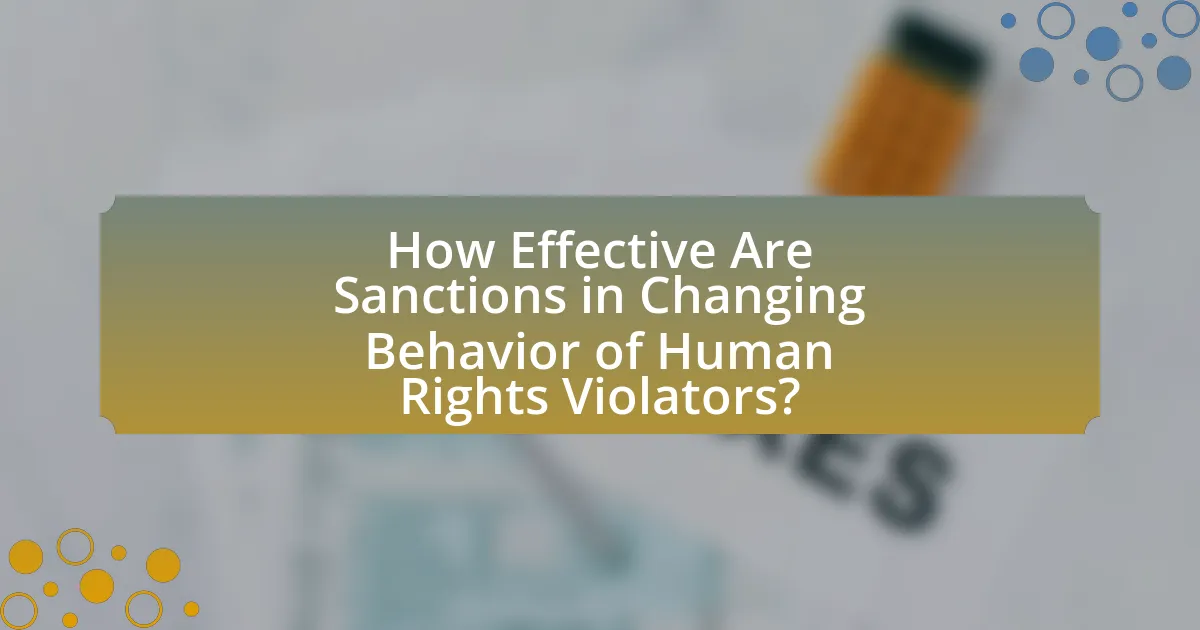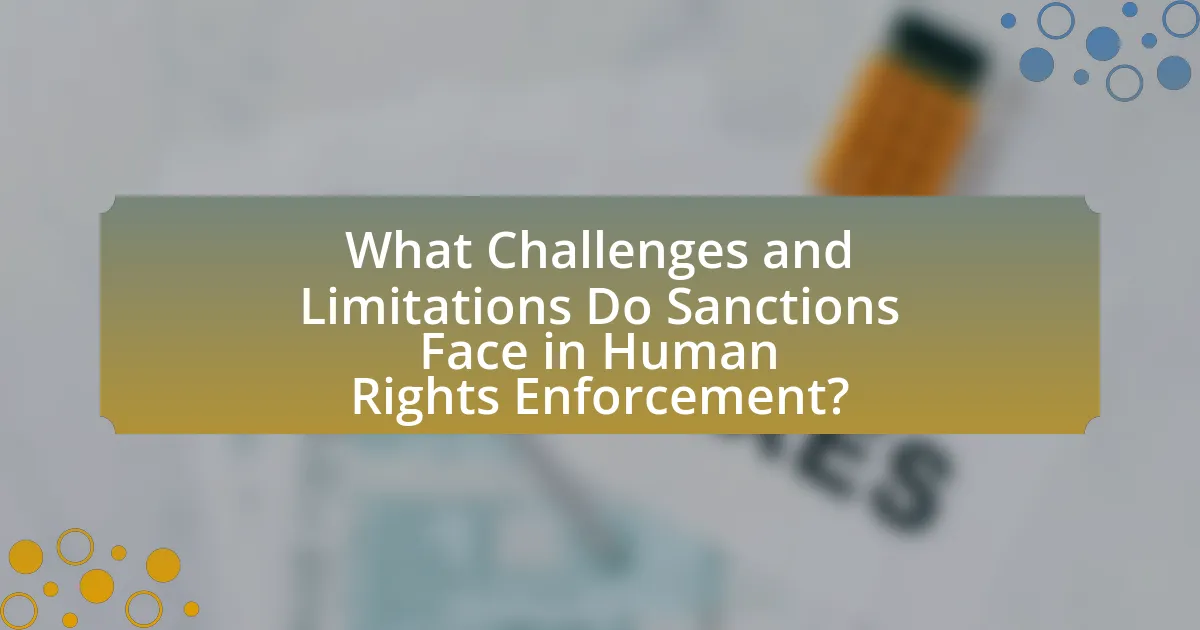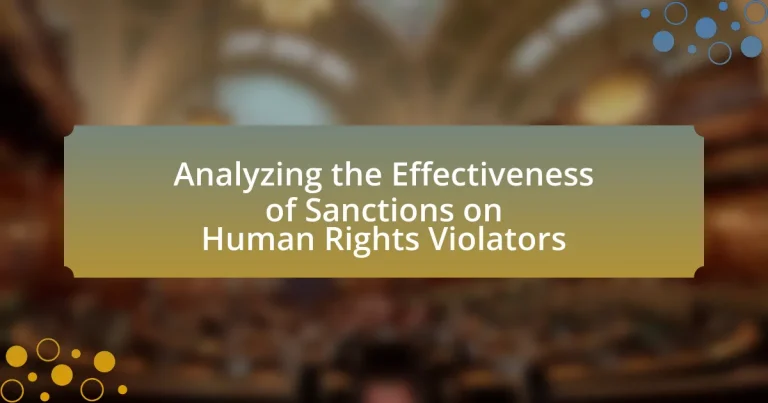Sanctions are punitive measures imposed by countries or international organizations to influence the behavior of states or individuals, particularly in response to human rights violations. This article analyzes the effectiveness of various types of sanctions, including economic restrictions, travel bans, and arms embargoes, in promoting compliance with international human rights standards. It explores the challenges and limitations of sanctions, their impact on civilian populations, and the ethical implications of their use. Additionally, the article examines case studies of successful and unsuccessful sanctions, factors influencing their effectiveness, and best practices for implementation to enhance their impact on human rights violators.

What are Sanctions and How Do They Relate to Human Rights Violators?
Sanctions are punitive measures imposed by countries or international organizations to influence the behavior of a state or individual, often in response to violations of international law or human rights abuses. They can take various forms, including economic restrictions, trade embargoes, and travel bans, aimed at pressuring human rights violators to change their actions. For instance, the United Nations has imposed sanctions on countries like North Korea and Iran due to their human rights records and nuclear activities, demonstrating how sanctions serve as a tool to hold violators accountable and promote compliance with international human rights standards.
What types of sanctions are commonly imposed on human rights violators?
Common types of sanctions imposed on human rights violators include economic sanctions, travel bans, and arms embargoes. Economic sanctions restrict trade and financial transactions, targeting the violators’ ability to access resources; for example, the U.S. has imposed sanctions on countries like North Korea for human rights abuses. Travel bans prevent individuals identified as violators from entering certain countries, as seen in the European Union’s measures against officials in Belarus. Arms embargoes prohibit the sale of weapons to specific nations, aimed at reducing the capacity for further human rights violations, such as the arms embargo against Myanmar following its military coup.
How do economic sanctions differ from diplomatic sanctions?
Economic sanctions involve the restriction of trade and financial transactions to influence a country’s behavior, while diplomatic sanctions entail the reduction or severance of diplomatic relations without necessarily imposing economic restrictions. Economic sanctions can include trade embargoes, asset freezes, and financial restrictions, which directly impact a nation’s economy and can lead to significant economic hardship. In contrast, diplomatic sanctions may involve actions such as expelling diplomats or downgrading diplomatic ties, which primarily aim to signal disapproval and isolate the offending nation on the international stage. For example, the United States imposed economic sanctions on Iran to curb its nuclear program, while it has also utilized diplomatic sanctions by reducing diplomatic engagement with countries that violate human rights.
What role do travel bans play in sanctioning human rights violators?
Travel bans serve as a critical tool in sanctioning human rights violators by restricting their ability to travel internationally, thereby limiting their influence and mobility. These bans signal international condemnation of human rights abuses and can deter future violations by holding perpetrators accountable. For instance, the European Union has implemented travel bans against individuals involved in serious human rights violations, such as those responsible for the repression of protests in Belarus in 2020. Such measures not only isolate violators but also serve to pressure governments to change their policies, as seen in cases where travel restrictions have been part of broader sanctions that include asset freezes and trade restrictions.
Why are sanctions considered a tool for promoting human rights?
Sanctions are considered a tool for promoting human rights because they aim to pressure governments or entities that violate human rights to change their behavior. By imposing economic or political restrictions, sanctions can diminish the resources available to oppressive regimes, thereby limiting their capacity to commit further abuses. Historical examples, such as the sanctions against South Africa during apartheid, demonstrate that international pressure can lead to significant reforms in human rights practices. Additionally, targeted sanctions, like asset freezes and travel bans on specific individuals responsible for human rights violations, directly hold perpetrators accountable, reinforcing the principle that human rights must be respected.
How do sanctions aim to deter future human rights violations?
Sanctions aim to deter future human rights violations by imposing economic and political costs on violators, thereby discouraging further misconduct. These measures can include trade restrictions, asset freezes, and travel bans, which create significant financial and operational challenges for the targeted individuals or regimes. Historical evidence shows that sanctions, such as those imposed on South Africa during apartheid, contributed to changes in government behavior by increasing domestic and international pressure for reform. Additionally, the threat of sanctions can serve as a preventive measure, signaling to potential violators that there will be consequences for their actions, thus promoting adherence to human rights norms.
What are the ethical implications of using sanctions for human rights enforcement?
The ethical implications of using sanctions for human rights enforcement include the potential for harm to innocent civilians and the question of effectiveness in achieving desired outcomes. Sanctions often target entire nations or economies, which can lead to widespread suffering among the general population, undermining the moral justification for such measures. For instance, the United Nations sanctions on Iraq in the 1990s resulted in significant humanitarian crises, affecting millions of civilians while failing to compel the government to change its behavior. Additionally, the effectiveness of sanctions is debated; studies indicate that they rarely lead to significant policy changes without accompanying diplomatic efforts, raising concerns about their ethical justification as a standalone tool for human rights enforcement.

How Effective Are Sanctions in Changing Behavior of Human Rights Violators?
Sanctions are often moderately effective in changing the behavior of human rights violators, but their success varies based on several factors. For instance, targeted sanctions, such as asset freezes and travel bans, can pressure individuals responsible for human rights abuses, as evidenced by the European Union’s sanctions against officials in Belarus following the 2020 presidential election, which aimed to hold accountable those involved in repression. However, comprehensive economic sanctions may not significantly alter the behavior of regimes that prioritize survival over international legitimacy, as seen in North Korea, where extensive sanctions have not led to improvements in human rights conditions. The effectiveness of sanctions also depends on the unity and commitment of the international community in enforcing them, as fragmented approaches can diminish their impact.
What evidence exists regarding the effectiveness of sanctions?
Evidence regarding the effectiveness of sanctions indicates that they can lead to significant changes in the behavior of targeted states, particularly in the context of human rights violations. For instance, a study by Hufbauer et al. (2009) titled “Economic Sanctions Reconsidered” found that sanctions were successful in achieving their stated goals in about one-third of cases, with notable examples including the sanctions against South Africa during the apartheid era, which contributed to the end of institutionalized racial segregation. Additionally, research published in the “Journal of Peace Research” by Pape (1997) demonstrated that sanctions can compel states to alter their policies, particularly when they are multilateral and supported by a strong international consensus. These findings underscore that while sanctions are not universally effective, they can be a powerful tool for influencing state behavior regarding human rights.
How do sanctions impact the political landscape of targeted countries?
Sanctions significantly alter the political landscape of targeted countries by undermining the authority of the ruling government and fostering internal dissent. For instance, economic sanctions can lead to increased poverty and unemployment, which often results in public discontent and protests against the government. Historical examples include the sanctions imposed on Iraq in the 1990s, which weakened the regime’s control and contributed to widespread unrest. Additionally, sanctions can isolate political leaders internationally, reducing their legitimacy and ability to engage in diplomacy, as seen with North Korea, where sanctions have led to heightened tensions and a more aggressive stance from the regime. Overall, sanctions can destabilize governments, provoke civil unrest, and shift power dynamics within targeted nations.
What case studies illustrate successful or unsuccessful sanctions?
Successful sanctions are illustrated by the case of South Africa during the 1980s, where international sanctions contributed to the end of apartheid. The United Nations imposed economic sanctions and arms embargoes, which, combined with internal resistance, pressured the government to negotiate and ultimately dismantle apartheid. Conversely, the sanctions imposed on North Korea have been largely unsuccessful in curbing its nuclear program. Despite extensive sanctions from the UN and various countries, North Korea has continued its weapons development, demonstrating the limitations of sanctions in achieving desired policy changes.
What factors influence the effectiveness of sanctions?
The effectiveness of sanctions is influenced by several key factors, including the type of sanctions imposed, the targeted country’s economic resilience, the level of international support, and the clarity of the sanctions’ objectives. For instance, comprehensive economic sanctions may have a more significant impact on a country’s economy compared to targeted sanctions that focus on specific individuals or entities. The economic resilience of the targeted country, such as its ability to withstand external pressures and find alternative trade partners, also plays a crucial role; countries with diversified economies may mitigate the effects of sanctions more effectively. Additionally, strong international support for the sanctions can enhance their legitimacy and effectiveness, as seen in the case of sanctions against Iran, where a coalition of countries worked together to impose restrictions. Finally, clear and achievable objectives for the sanctions can lead to better outcomes, as ambiguous goals may result in prolonged conflicts without resolution.
How does the level of international support affect sanction outcomes?
The level of international support significantly influences sanction outcomes by enhancing their effectiveness and legitimacy. When a broad coalition of countries supports sanctions, it increases the economic and political pressure on the targeted state, making it more likely to comply with international demands. For instance, the coordinated sanctions against Iran, supported by multiple nations and international organizations, effectively pressured the Iranian government to negotiate its nuclear program, leading to the Joint Comprehensive Plan of Action in 2015. Conversely, unilateral sanctions or those lacking widespread support often fail to achieve their intended goals, as the targeted state can seek alternative alliances and markets. This demonstrates that international backing is crucial for the success of sanctions in altering the behavior of human rights violators.
What role does the targeted regime’s resilience play in sanction effectiveness?
The targeted regime’s resilience significantly diminishes sanction effectiveness by enabling the regime to withstand economic pressure and maintain its power. Resilient regimes often adapt to sanctions through alternative trade routes, domestic resource mobilization, or by fostering nationalist sentiments that rally public support against perceived external threats. For instance, North Korea has developed a network of illicit trade and strengthened its military-first policy, allowing it to endure extensive international sanctions while continuing its nuclear program. This adaptability undermines the intended impact of sanctions, as the regime can persist in its actions despite economic isolation.

What Challenges and Limitations Do Sanctions Face in Human Rights Enforcement?
Sanctions face significant challenges and limitations in human rights enforcement, primarily due to their often limited impact on the targeted regimes and the potential for unintended consequences. For instance, while sanctions aim to pressure governments to change their behavior, they frequently fail to achieve their intended outcomes, as evidenced by the ongoing human rights violations in countries like North Korea and Syria despite extensive sanctions. Additionally, sanctions can exacerbate humanitarian crises by harming civilian populations more than the intended political elites, as seen in the case of Iraq in the 1990s, where sanctions led to widespread suffering among civilians without significantly altering the regime’s actions. Furthermore, the effectiveness of sanctions is often undermined by evasion tactics employed by targeted states, such as developing alternative trade partnerships or illicit networks, which dilute the intended pressure. These factors collectively illustrate the complexities and limitations of using sanctions as a tool for enforcing human rights standards.
What are the unintended consequences of imposing sanctions?
Imposing sanctions can lead to unintended consequences such as humanitarian crises, economic destabilization, and increased anti-government sentiment. Humanitarian crises often arise as sanctions restrict access to essential goods, including food and medicine, disproportionately affecting vulnerable populations. For instance, the sanctions imposed on Iraq in the 1990s resulted in significant civilian suffering, with estimates of hundreds of thousands of child deaths due to malnutrition and lack of medical supplies. Economic destabilization can occur as sanctions disrupt trade and investment, leading to job losses and increased poverty. Additionally, sanctions may bolster the resolve of targeted regimes, fostering a rally-around-the-flag effect where citizens unite against perceived external threats, as seen in North Korea following international sanctions. These consequences highlight the complex dynamics of sanctions and their potential to exacerbate the very issues they aim to address.
How do sanctions affect the civilian population in targeted countries?
Sanctions negatively impact the civilian population in targeted countries by restricting access to essential goods and services. These measures often lead to shortages of food, medicine, and other critical supplies, exacerbating poverty and health crises. For instance, a study by the United Nations in 2019 highlighted that sanctions on Venezuela resulted in a 60% increase in malnutrition rates among children. Additionally, sanctions can disrupt economic stability, leading to increased unemployment and reduced public services, which further deteriorates living conditions for civilians.
What are the risks of sanctions leading to increased repression?
Sanctions can lead to increased repression by empowering authoritarian regimes to consolidate power and suppress dissent. When faced with economic pressure, governments may respond by intensifying security measures, restricting civil liberties, and targeting opposition groups to maintain control. For instance, research indicates that in countries like Iran and North Korea, sanctions have been correlated with heightened state surveillance and crackdowns on protests, as regimes seek to divert public anger and reinforce their authority. This dynamic illustrates how sanctions, rather than promoting reform, can inadvertently strengthen repressive tactics employed by governments under stress.
How can sanctions be improved to enhance their effectiveness?
Sanctions can be improved to enhance their effectiveness by increasing their specificity and targeting, which ensures that they directly impact the individuals and entities responsible for human rights violations. For instance, the European Union’s targeted sanctions against specific officials in regimes known for human rights abuses have shown greater success in altering behavior compared to broad economic sanctions that affect the general population. Additionally, incorporating mechanisms for monitoring and enforcement can strengthen compliance and accountability, as evidenced by the United Nations’ sanctions regimes that include regular reporting and assessments. These strategies demonstrate that well-defined, targeted, and monitored sanctions can lead to more significant changes in the behavior of human rights violators.
What strategies can be employed to ensure sanctions are targeted and precise?
To ensure sanctions are targeted and precise, employing a comprehensive assessment of the specific individuals or entities involved in human rights violations is essential. This involves utilizing intelligence and data analytics to identify key actors responsible for abuses, rather than imposing broad sanctions that may affect the general population. For instance, the U.S. Treasury Department’s Office of Foreign Assets Control (OFAC) often uses lists of designated individuals and entities based on their direct involvement in human rights abuses, which demonstrates the effectiveness of targeted sanctions. Additionally, engaging with local human rights organizations can provide valuable insights into the most culpable parties, ensuring that sanctions are not only precise but also effective in promoting accountability.
How can international cooperation strengthen the impact of sanctions?
International cooperation can strengthen the impact of sanctions by ensuring unified enforcement and broad compliance among nations. When multiple countries collaborate to impose sanctions, it creates a more significant economic and political pressure on the targeted entity, making it harder for them to evade the consequences. For instance, the coordinated sanctions against Iran by the United States, European Union, and other nations significantly curtailed its oil exports and access to international financial systems, demonstrating the effectiveness of a collective approach. This unified stance not only amplifies the sanctions’ impact but also discourages third-party nations from undermining the efforts, thereby enhancing the overall effectiveness of the sanctions in promoting human rights compliance.
What best practices should be followed when implementing sanctions against human rights violators?
Best practices for implementing sanctions against human rights violators include ensuring targeted measures, maintaining international cooperation, and establishing clear criteria for sanctions. Targeted measures focus on specific individuals or entities responsible for violations, minimizing unintended harm to the general population. International cooperation enhances the legitimacy and effectiveness of sanctions, as seen in the coordinated actions of the European Union and the United States against individuals in regimes like North Korea and Syria. Clear criteria for sanctions, such as documented evidence of human rights abuses, provide transparency and accountability, which are essential for maintaining support from the international community and ensuring compliance.


